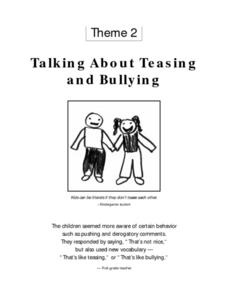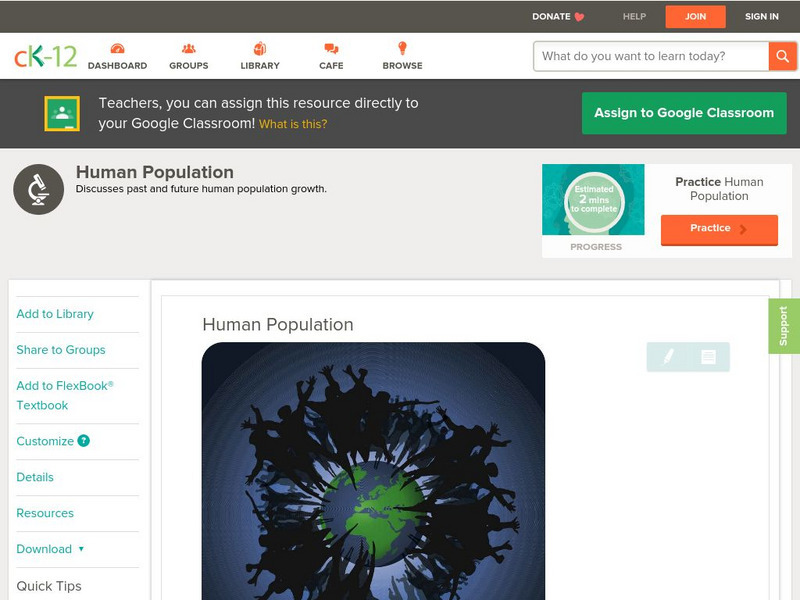Curated OER
Talking About Teasing and Bullying
Students discover how it feels to be bullied and teased. They work together in pairs to write about experiences and use drawings to show their feelings.
Curated OER
Different Types of Orange Juice Contain the Same Amounts of Vitamin C?
High schoolers measure and compare the amount of vitamin C in orange juice samples. They discover the effects of different factors on the concentration of vitamin C. They participate in an experiment to test the orange juice.
Curated OER
Animals Piece by Piece
Learners sort organisms and objects into groups according to their parts and describe how the groups are formed.They identify body parts of animals from puzzle pieces, assemble the puzzle, and name the animal.
Curated OER
The Market for Moving People to America, 1610-1775
Students examine the markets that brought people to America. They identify the role of the immigrants in creating this country. They also analyze data to gather information about the time period.
Curated OER
The Berlin Wall
Middle schoolers enter the classroom and observe a wall that is set up with desks, bookshelves, or anything else available. to create a barrier that they cannot cross during the class. The class then is divided into East and West Berlin...
Curated OER
DID YOU HELP CREATE THIS
Students examine whether their actions are positively or negatively affecting organisms and their habitats. They choose an animal to study then create a multimedia presentation including charts and graphs of data logger information and...
Curated OER
Immigration in the Late 1800's
Seventh graders explore the progression of immigration patterns in the United States. They examine how immigrants perceived and adapted to the United States culture. Students discuss how immigrants were able to perserve their culture in...
Curated OER
Mitosis and Meiosis
Students model and differentiate between the processes of mitosis and meiosis. In partners, they use yarn and construction paper to create models for each of the phases of mitosis and meiosis then compare the chromosome numbers in each...
Curated OER
A Sense of West Virginia
Students consider their perceptions of the world through their 5 senses while visiting the West Virginia State Museum. In this West Virginia history lesson, students discover how knowing about the past helps with their understanding of...
Other
Teenage Growth and Development: 15 17
As a teen approaches adulthood, a sense of autonomy has replaced some of the feelings of insecurity associated with physical development. This article looks at some of these new developments and provides parents with tips on how to...
Other
Teenage Growth and Development: 11 14
During the ages of 11 to 14, children begin a sequence of changes that produces significant emotional and physical changes. This article outlines some of those changes and how parents can support these developments.
Other
Story md.com: Infant and Newborn Development
When will my baby take his first step or say her first word? During their first year, babies start to develop skills they will use for the rest of their lives. The normal growth of babies can be broken down into the following areas:...
Akron Children's Hospital
Akron Children's Hospital: Kidshealth: Growth Disorders
Everyone grows and matures differently. A growth disorder, however, means that a kid is either growing a lot slower or a lot faster than other kids the same age.
OpenStax
Open Stax: Anatomy & Physiology: Development and Aging of Endocrine System
Find out about the structure and function of the human edocrine system, and how it develops and changes with age.
PBS
Nova: Eighteen Ways to Make a Baby
Companion website to a NOVA broadcast of the same name, Eighteen Ways documents the world of assisted reproduction. Find information on in vitro fertilization, the challenges of infertility, human cloning, advances in micro-manipulation,...
Geographypods
Geographypods: Patterns and Change: Disparities in Wealth and Development
This collection of four learning modules looks at issues related to the unequal distribution of wealth and economic development. Examines how this is measured and presents student video assignments on this topic, followed by a discussion...
CK-12 Foundation
Ck 12: Life Science: Human Population
[Free Registration/Login may be required to access all resource tools.] How quickly is the human population growing? If we look at worldwide human population growth from 10,000 BCE through to today, our growth looks like exponential...
CK-12 Foundation
Ck 12: Biology: Fetus Growth and Development
[Free Registration/Login may be required to access all resource tools.] Covers major events in the growth and development of the fetus.
CK-12 Foundation
Ck 12: Biology: Development From Birth to Adulthood
[Free Registration/Login may be required to access all resource tools.] Covers milestones in growth and development from birth to adulthood.
Khan Academy
Khan Academy: What Is Urban Growth?
How were cities formed? This article explains the formation of cities starting from the neolithic revolution to current times. It addresses such topics as urbanization, suburban sprawl, and urban growth models.
McGraw Hill
Glencoe Biology: Birth, Growth, and Aging: Self Check Quiz
Try these five multiple-choice questions about birth, growth, and aging. Each question has a clickable hint prompt as well as a self-checking feature.
Virginia Tech
Virginia Cooperative Extension: Publications: Adolescent Growth and Development
During adolescence, teens begin to change physically, cognitively, and psychosocially in preparation for adulthood. Comprehensive article, aimed primarily at an adult readership, describes how adolescents develop.
Untamed Science
Untamed Science: Biology: Human Biology: Endocrine System
Read and watch a series of videos on how our bodies regulate mood, growth, and development with complex chemicals.
Khan Academy
Khan Academy: Us History: 1865 1898: Westward Expansion: Economic Development
In the late nineteenth century, the West developed into a modern agricultural machine- at the expense of farmers.






















